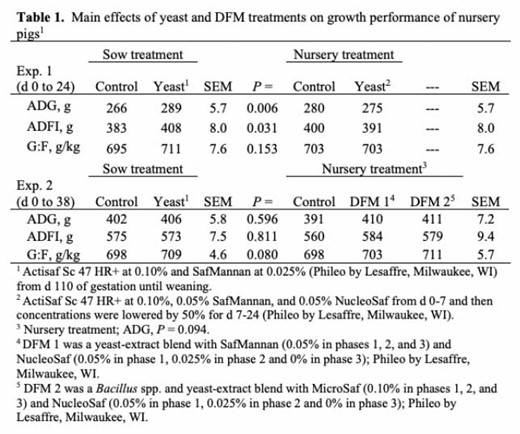-
PDF
- Split View
-
Views
-
Cite
Cite
Jenna A Chance, Joel M DeRouchey, Robert D Goodband, Jason C Woodworth, Mike D Tokach, Joseph Loughmiller, Brian Hotze, Jordan T Gebhardt, 129 The Effect of Live Yeast and Yeast Extracts Included in Lactation and Nursery Diets on Nursery Pig Growth Performance, Journal of Animal Science, Volume 100, Issue Supplement_2, May 2022, Pages 59–60, https://doi.org/10.1093/jas/skac064.095
Close - Share Icon Share
Abstract
Two experiments were conducted to determine the impact of diets with yeast-based direct fed microbials (DFM) in nursery pigs weaned from sows fed lactation diets with or without yeast additives. Treatment descriptions for both experiments are reviewed in Table 1. There was no evidence of sow and nursery treatment interactions for either experiment (P > 0.05). In Exp. 1, 340 weaned pigs, initially 5.1 kg ± 0.02, were used to evaluate previous sow treatment (control vs yeast additives; Phileo by Lesaffre, Milwaukee, WI) and nursery diets with or without DFM. Treatments were a 2×2 factorial with main effects of sow treatment and nursery treatment (control vs. yeast-based pre- and probiotic diet) with 5 pigs/pen and 17 replications/treatment. Progeny from sows fed yeast additives had increased (P < 0.05) ADG from d 0-24 and d 0-45. However, pigs that were fed yeast additives for the first 24 d in the nursery tended to have decreased d 0-45 ADG (P = 0.079). In Exp. 2, 330 weaned pigs, initially 5.8 kg ± 0.03, were used to evaluate diets with combinations of DFM. Treatments were arranged in a 2×3 with main effects of sow (same as Exp. 1) and nursery treatment with 6 pigs/pen and 8 to 10 replications/treatment. From d 0-10 post-weaning, progeny of sows fed yeast additives had increased (P < 0.05) ADG and G:F. From d 24-38 when pigs were fed common diets with no added yeast-based products, ADG for pigs previously fed DFM2 was greater (P < 0.05) than control. In conclusion, feeding sows yeast during lactation improved offspring nursery growth performance in both studies. Interestingly, feeding live yeast and yeast extracts reduced nursery pig performance in Exp. 1; however, feeding DFM 2 improved growth later in the nursery in Exp. 2.




